B2B customer service: An ultimate guide for UK businesses that serve other businesses

Customer Support Manager - Tier 1

Tags
Share
If you want to keep your customers happy, you need to provide them with great customer service. B2B customer service is more challenging than B2C customer service in a few ways—not least because your customers often have much more at stake.
There are also differences in how you approach B2B customer service and the resources you’ll need, such as the technology in your contact centre platform.
We’re going to cover everything you’ll need to know about B2B customer service, including what sets it apart from B2C customer service, tools that can make your teams’ jobs easier, and best practices to consider.
What is B2B customer service?
B2B (business-to-business) companies sell products or services to other companies. Because B2B organisations rely so heavily on customer loyalty and retention for revenue growth, providing a fantastic customer experience is essential.
B2B customer service covers any and all service interactions between a B2B company and its customers. B2B service, then, refers to every instance of help, care, and support you provide from the moment a prospective client starts their journey along your sales funnel right through to the point of repurchase or renewal.
B2B customer service vs B2C customer service: How do they differ?
While B2B companies sell to other businesses, B2C (business-to-consumer) companies sell to the general public.
While many of the general customer service principles are the same across both business models, there are some unique distinctions you should be aware of:
You must satisfy multiple stakeholders at each client’s company
B2C transactions usually take place between a business and a single consumer. More often than not, a B2B company will have to build and manage relationships with entire teams rather than one individual.
This means that B2B businesses need to impress a range of people with different opinions, experiences, and concerns before they can make a sale. B2B sales also become increasingly complicated as more stakeholders become involved in a purchasing decision.
This carries over to the customer support space. The more teams or individuals that use a product or service within an organisation, the more users a B2B provider must keep track of. This means maintaining numerous relationships, tracking a variety of help and support cases, and juggling the multiple priorities of business-to-business service users.
The onus is on B2B companies’ support teams to keep a close eye on how each of these relationships progresses, often making use of tools such as customer relationship management (CRM) and contact centre platforms to stay on top of things.
The needs of each customer will likely be more complex and unique
B2C customer service enquiries tend to be quite predictable. Perhaps the customer needs a refund because their product is damaged, is the wrong size, or was bought in error.
Usually, the whole process is handled with a quick phone call or email, or in some instances, it might even be automated. This means that, generally, customer support agents can solve these queries without too much fuss.
In contrast, there’s a much wider range of B2B customer service examples—and they can be a lot more complicated. In most instances, the issues that B2B customers tend to face are much more technical and require a more personalised approach to be solved satisfactorily.
This could involve a tech support agent liaising with other teams, such as product or development, to solve a problem, or it might require digging through a customer’s decade-long history of interactions and purchases to provide a more personalised experience.
In other words, B2B customer service representatives often need to invest a lot more time and effort in solving customer service queries.
You’ll (hopefully) work with each customer more closely and for longer
As we touched on before, many B2C customer interactions are fleeting. Customers want the right product at the best price, and once they’ve got it, they’re off. While concepts like customer loyalty and ambassadorship are important in the world of B2C, they’re much more crucial in B2B sales.
A B2B relationship should ideally last a long time, to increase your customer lifetime value. This provides many opportunities for your B2B business to wow your customers with great customer service. However, it also means that a negative interaction could have a much greater impact on the ongoing relationship.
To ensure that every interaction with their customers is a positive one and provide consistently excellent customer service, B2B businesses often establish account managers and customer success teams to help spearhead these relationship-building efforts.
By doing so, B2B companies can give themselves the best possible chance of maintaining long-running, profitable customer relationships.
Why customer service is vital in the B2B niche
Providing great customer service is essential in any industry, but it’s particularly crucial in B2B.
Customer retention and lifetime value is critical to B2B customers
Firstly, customer retention and customer lifetime value are two vital metrics for B2B businesses.
Customers are more likely to continue giving their business to brands that provide them with great B2B customer experiences. Customers who receive subpar customer service are much more likely to shop around, potentially taking their business elsewhere.
Therefore, if you want to hang on to your customers in the highly competitive world of B2B, you need to make sure they’re receiving top-quality customer service at all times. Otherwise, you leave yourself vulnerable to customers leaving, otherwise known as customer churn—a metric that subscription-based businesses measure.
Maintaining high levels of customer retention is so vital because it’s much more cost-effective to keep existing customers than it is to recruit new ones—especially as customer acquisition costs (CAC) continue to rise. When you retain customers, their lifetime value goes up. The longer they keep doing business with you, the higher it will climb.
Referrals and social proof are a great way to win new B2B business
Keeping your customers satisfied doesn’t just make them much more likely to stick around. It also makes them more likely to do your marketing for you. Referrals and social proof are one of the most cost-effective marketing tools that will help you gain new customers through word of mouth.
Think about all the different colleagues and people in your network you deal with on a day-to-day basis. If you recommend a product or service to each and every one of them, chances are some of them are at least going to check it out. This is especially true if they trust you and you’ve given the product or service a glowing review in the process.
When businesses deal with other companies in the same industry, it’s inevitable that there’s going to be some overlap in the products and services they require. If each of your clients makes a positive recommendation about your business to even just a few of their contacts, word of your business will spread.
Positive online reviews, customer testimonials, and simple word of mouth all help to contribute to this effect.
Of course, the opposite is also true. A customer is just as likely to warn their contacts about a company they’ve had a bad experience with. This makes it even more crucial that every one of your clients has a positive experience with your brand and goes out into the world singing your praises rather than complaining about your products or services.
B2B customer service best practices to adopt in your business
So, with all that being said, how exactly do you go about improving the B2B customer service strategy in your business? Here are six ways to do it:
1. Create and maintain a customer-centric culture
Every interaction that a customer has with your business contributes to their overall customer experience. Creating and maintaining a customer-centric culture means ensuring that as many interactions as possible are positive. (Learn more about how to build customer focus in a contact centre.)
Every employee, from marketing and sales teams right through to your customer support agents, needs to understand the precise role they play in the customer journey and how they contribute to a positive customer experience.
2. Streamline processes with automation and Ai—but don’t lose the human touch
One of the factors that has the greatest impact on the quality of your customer service is how quickly you can provide it. Customers don’t want to be waiting ages to receive support, especially when those customers are other businesses whose bottom lines are shrinking with every second they lose.
Streamlining your customer service process with automation and Ai helps you provide a more efficient customer service experience. However, it’s important not to lose the human touch in your customer service interactions.
Many customers still want to connect with a human when they reach out for support, especially when it comes to sensitive issues. Generally, it’s best to have a mix of both automated and live support, with the option for customers to easily route themselves to a human agent when they feel it’s necessary.
For example, Dialpad’s Ai Agent support can help you provide 24/7 customer service, linking up with your website’s knowledge bases, CRM platform, and support ticketing system to provide a seamless, efficient, and effective customer service experience.
More importantly, you can build an escalation option into the conversation flow:
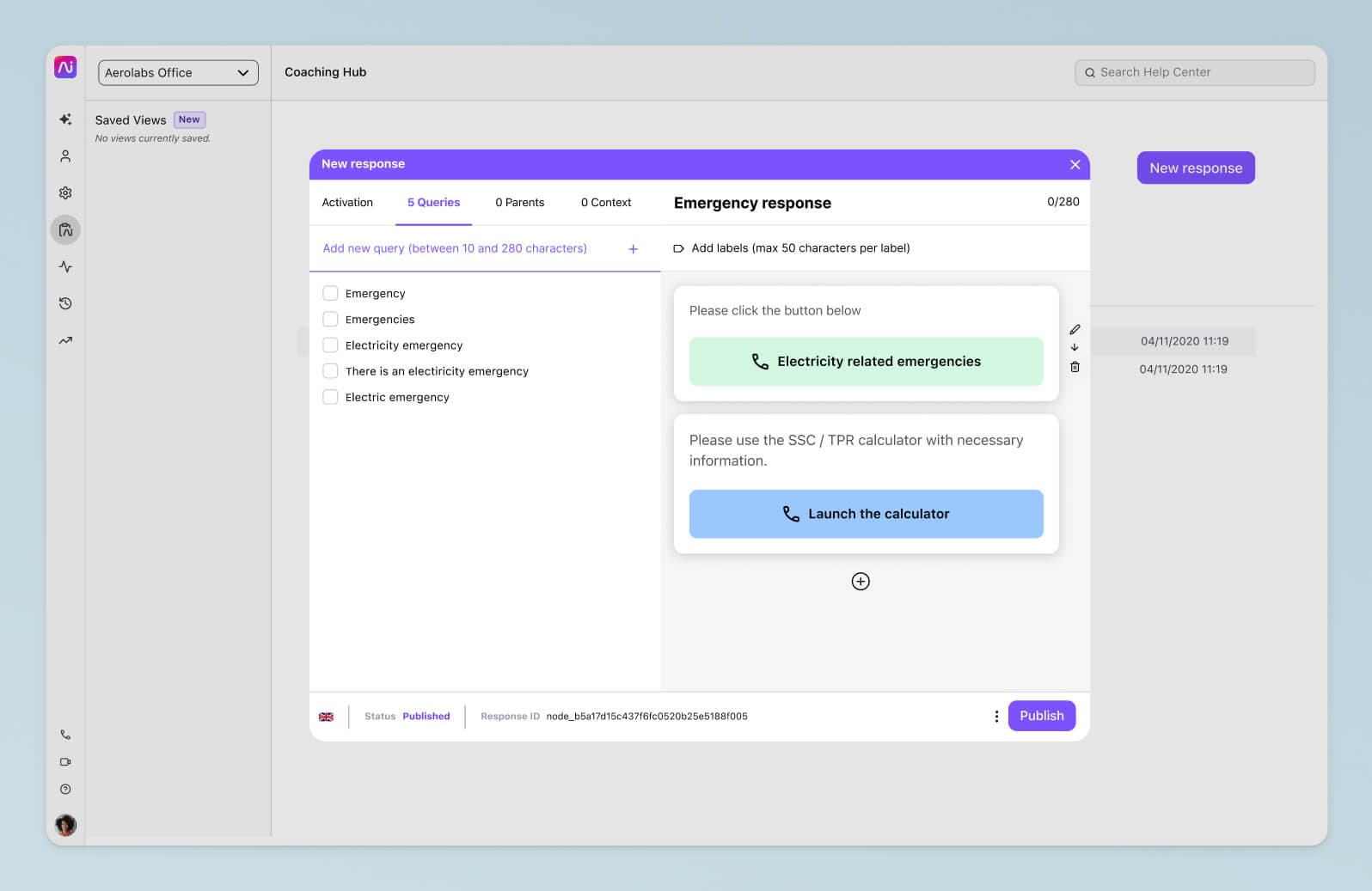
3. Connect your teams
Many common problems faced by a B2B customer are complex and require the input of multiple teams to correct.
Effective cross-team collaboration across your business, therefore, makes delivering exceptional customer service that much easier. To empower your teams to work together to find solutions to your customers’ problems quickly, equip them with communication and collaboration tools that give them options for how to talk to each other, whether that’s a quick message or voice call.
For example, Dialpad gives your teams a single platform through which they can message, call, and video chat with one another and external stakeholders, on both computers and mobile devices.
It can even integrate with other tools, such as your CRM platform of choice. This can help every team across your organisation stay apprised of a customer’s progress and communication history, meaning they can provide relevant customer service much more quickly.
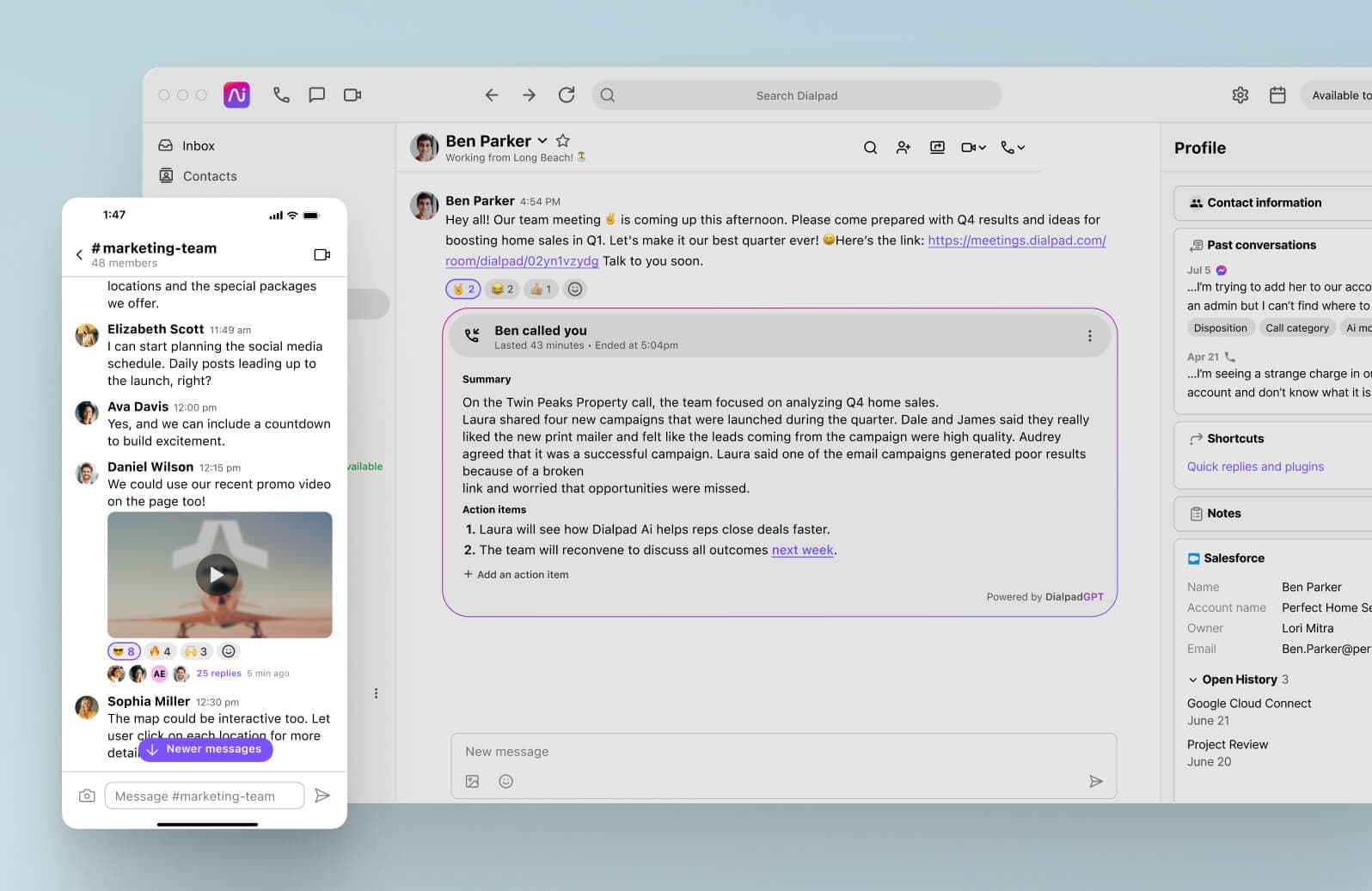
4. Make excellent customer service a key part of onboarding and training
Excellent customer service needs to be a priority at every level of your organisation. And it all starts with the onboarding experience, instilling new hires with a customer-oriented mindset from their first day in your business.
Your training and coaching programs should make these values clear, and provide tools and methodologies to support agents in hitting related metrics.
Coaching tools can be incredibly valuable here. For example, the Dialpad Ai Coaching Hub provides your supervisors with complete visibility into their teams’ performance, including CSAT scores and average handling times, flagging up potential issues and coaching opportunities.
From there, you can create coaching playlists to show agents how to handle problem calls or give examples of what not to do in tricky situations.
Dialpad also has an Ai Assistant feature, which automatically pops up on agents’ screens with notes on how to explain different topics to customers, playing a key role in potentially salvaging a poor customer service interaction.
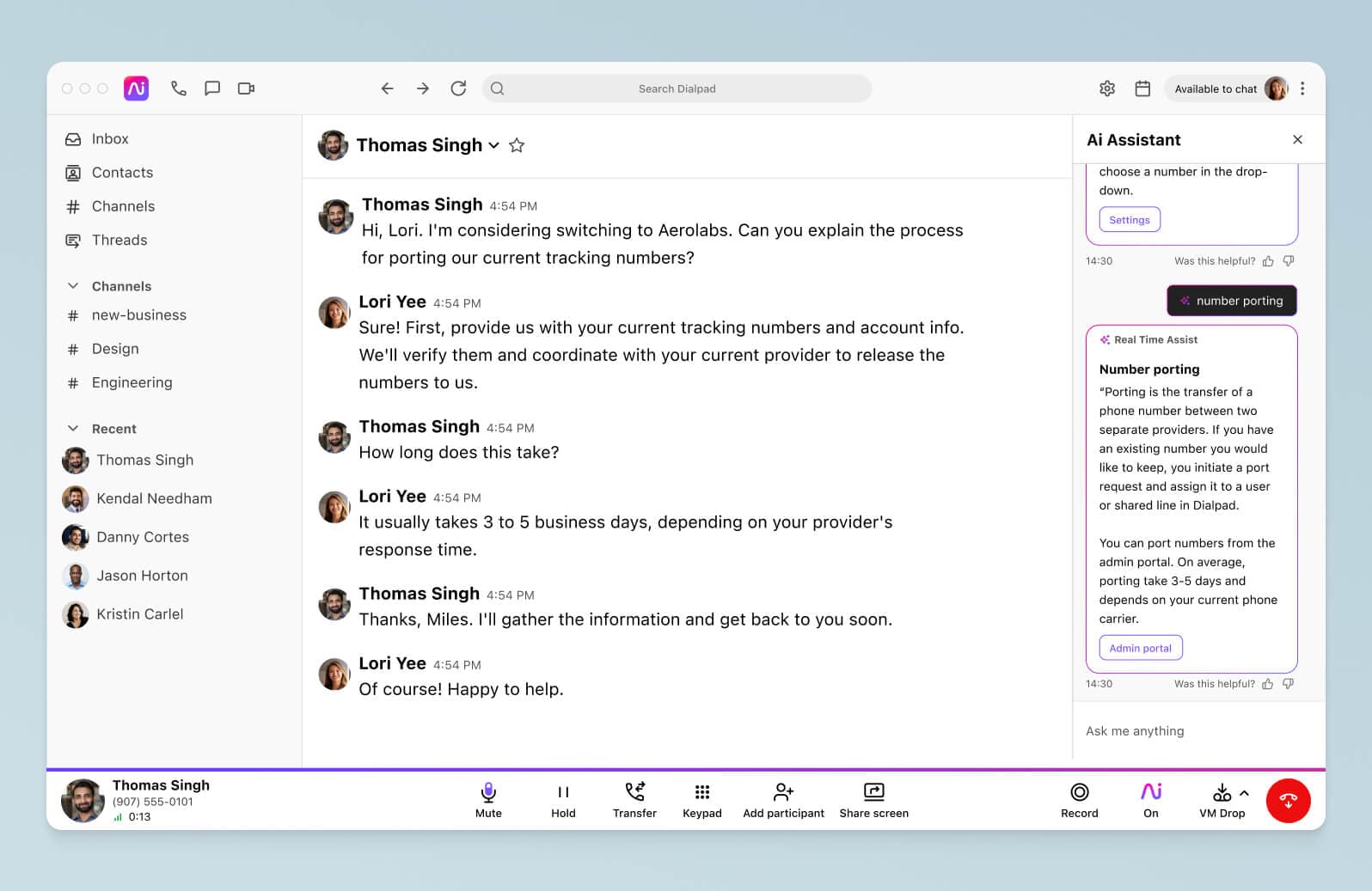
5. Deliver an omnichannel experience
Offering an omnichannel customer service experience allows your clients to reach you in the way that best suits them.
Whether it’s over the phone, email, or instant messaging, different clients may have varying preferences depending on their schedules, the nature of their business, or potentially even language barriers or time zone differences.
The key to delivering a great omnichannel experience is to use a platform that seamlessly pulls together the different threads of your communications tapestry.
Dialpad does just that, allowing you to connect with customers via a range of channels from one app. You can track customer conversations across multiple channels, such as WhatsApp or Facebook Messenger, all in one place without having to open and close multiple windows.
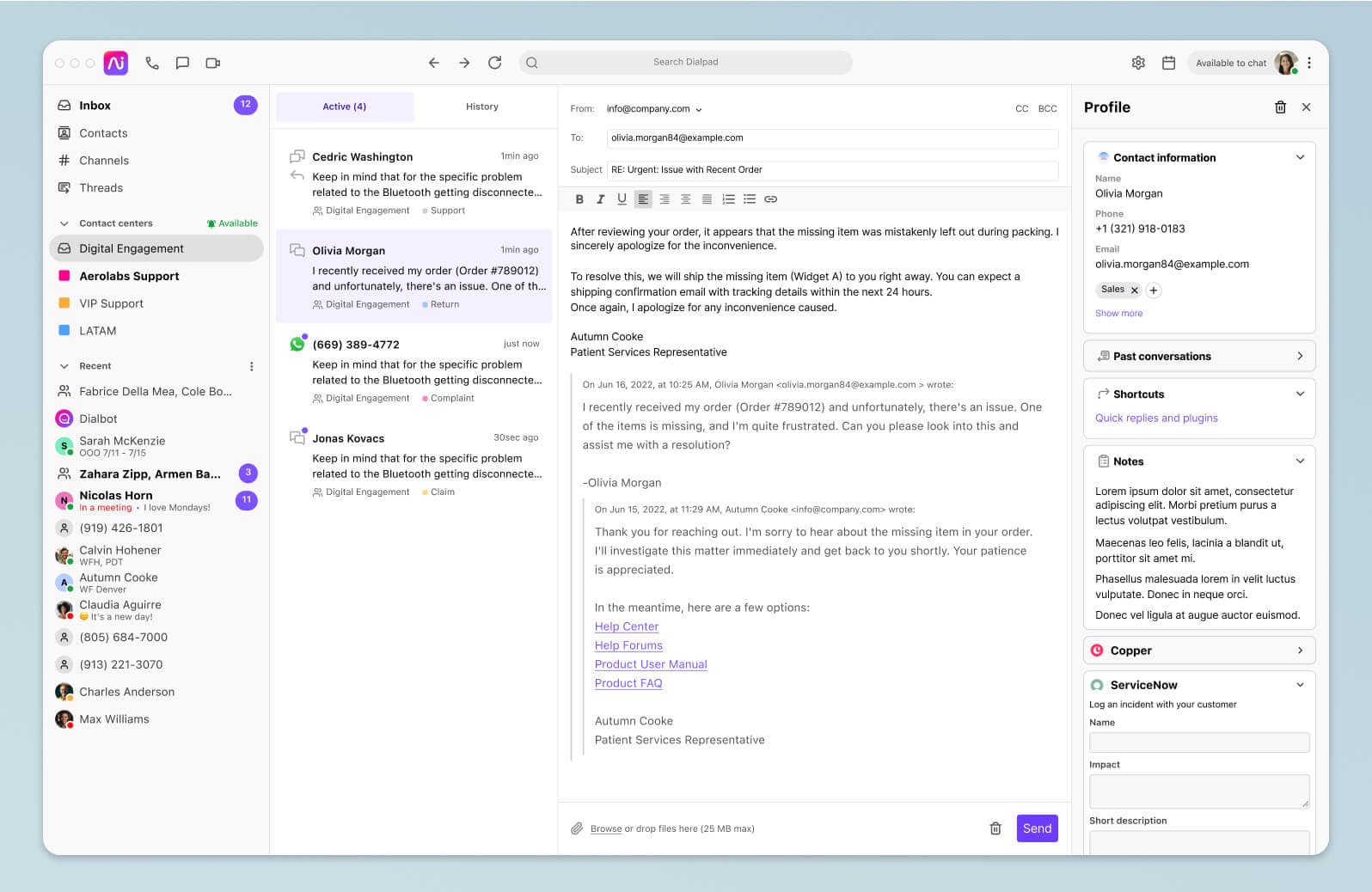
6. Seek out, analyse, and act upon customer feedback
What’s the best way to find out if you’re providing a good customer service experience?
Ask your customers.
Gathering feedback from clients who’ve gone through the customer service experience can give you valuable insights about what’s working and what could be improved.
You can then take this information and use it to implement meaningful changes, making sure you provide an even better experience for the next customer.
With Dialpad's Ai-powered customer engagement platform, you can quickly set up CSAT surveys that’ll be automatically delivered to your customers after every interaction.
And if you’re worried about customers not responding, don’t worry— the Ai CSAT feature can accurately predict CSAT scores for up to 100% of customer calls thanks to Dialpad’s hyper-accurate transcription.
Want an agent-by-agent breakdown of service provision? Dialpad Ai Scorecards use natural language processing and sentiment analysis to automatically score the performance of every customer interaction.
That gives supervisors unparalleled insight into how their agents are performing and highlights potential coaching opportunities.
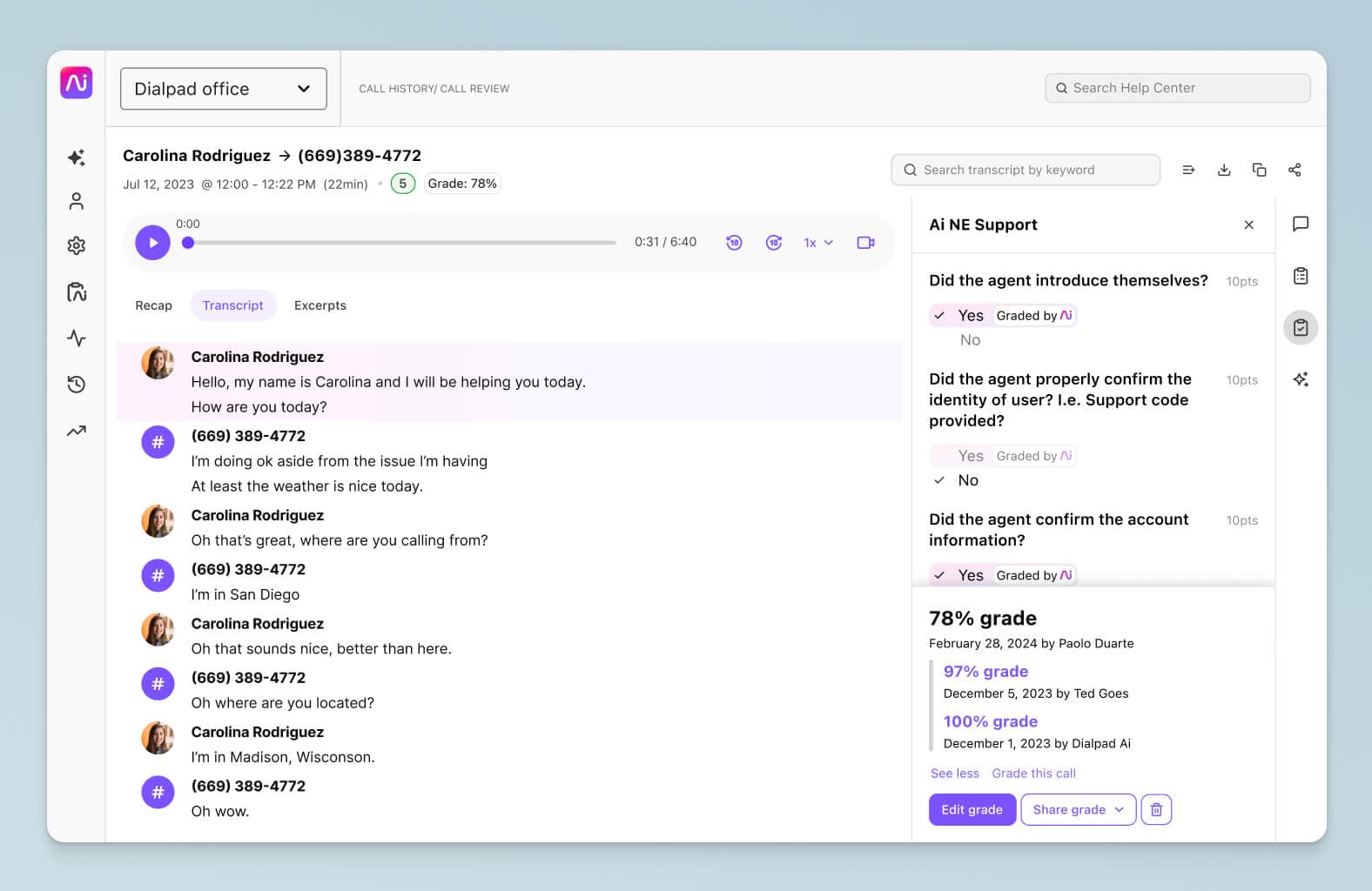
Ace B2B customer service with Dialpad Support
B2B customer service is key to providing a great customer experience, keeping your clients around longer, and generating positive word-of-mouth about your business.
And the trick to acing business-to-business customer service? Well, there’s not just one.
You need to build a customer-centric organisation from the ground up, making great customer service a priority for every employee, from new hires to ready-to-retires.
Offer as many customer service channels as your customers want and connect them all seamlessly behind the scenes. Keep your teams connected, too, using communication and collaboration tools that empower your employees to offer great customer service across sales and support.
Dialpad Support can help you bring this all together, with an Ai-powered customer engagement platform that brings all your customer interactions together on one easy-to-use platform.
Book a demo with our team to try it out for yourself, or take a self-guided interactive tour of the app!
Looking for a contact centre platform?
Looking for a contact center platform that's designed to help you improve your customer service? Book a demo of Dialpad Support or take a self-guided interactive tour of the app on your own first!








